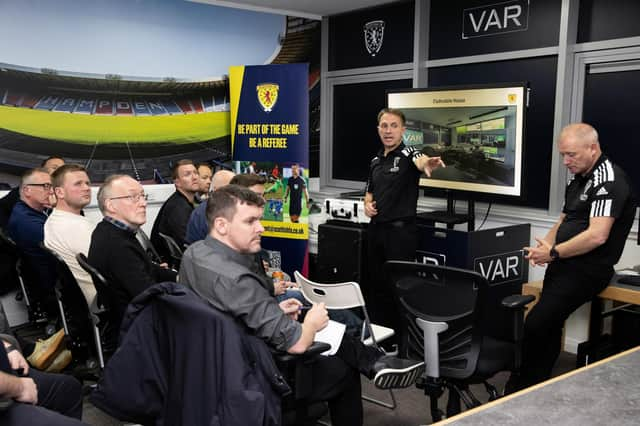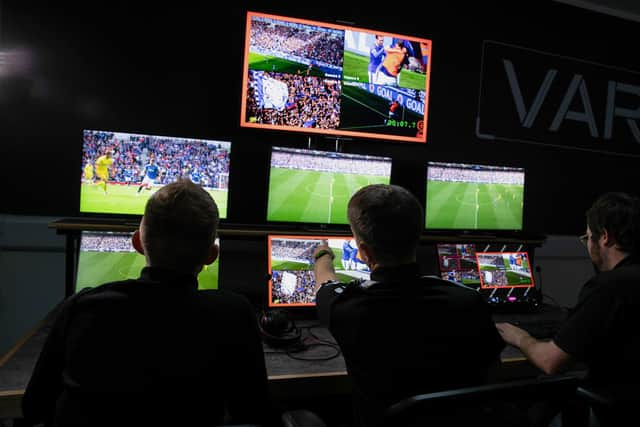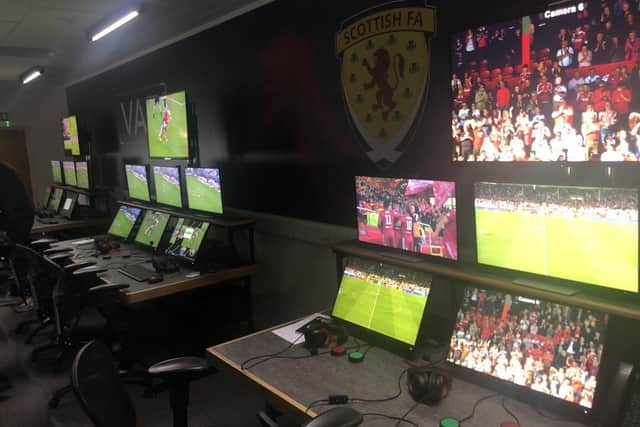Willie Collum opens up candidly on VAR: Wanting to press rewind, how difficult it is, big transfer of pressure


Unlike most of his indigenous colleagues, the 43-year-old official can trace his first experience of working in tandem with the video-check system back a full three years, to a Champions League encounter between Juventus and Bayer Leverkusen. Collum is candid enough to admit that it won’t be a straightforward adaptation for the men in black in this country to move into a VAR footballing world – which begins with Hibs’ host of St Johnstone next Friday. Not just over how they will be required to tailor their on-field refereeing. As much for the fact that half their duties now will consist of the mentally-draining task of being required to scan all manner of TV screens in the video operations room at the east end of Glasgow VAR hub.
Equally, the transition won’t be easy for supporters. Long stoppages – at least initially – can be expected for VAR checks. And with the majority of Scottish top-flight clubs without big screens at their grounds, such interventions will require to be communicated by tannoy announcers. Who will also need to inform punters in the event of the VAR epicentre being out of commission, for whatever reason. Really, what could possibly go wrong …
Advertisement
Hide AdAdvertisement
Hide AdYet, Collum’s primary focus is on all that could be put right through the technology coming on-stream. Or rather, how his fraternity – all-too-convenient-punchbags for game watchers – can be removed as the focus for so much ire. “This is about benefitting us in Scotland,” he said of improving Scottish referees standing in UEFA and FIFA competitions. “It’s to avoid the controversy here. That’s the biggest thing – to ensure we aren’t the headline anymore.”


That might be wishful thinking. Rarely does the school teacher’s name appear in any football discussion without the prefix "controversial”. The most heat generated by an official’s performance this season just had to involve him, Collum unfairly flogged for sending off John Lundstram at Easter Road – a red card subsequently rescinded – in a feisty encounter in which there was feverish debate over a penalty awarded to Rangers and his failure to point to the spot for Hibs. It was impossible not to ask him whether he would have craved having VAR in operation that August afternoon. Even if it meant becoming square-eyed at the number of times he may have been asked to consult a pitchside monitor. He didn’t take on that discussion point head on. However, he offered an intriguing assessment on the potential VAR effect overall.
“I’ve been refereeing for a long time,” Collum continued. “I think probably looking back it would have been a dream come true to be able to see things again. I used to tell people when I described refereeing watching games at night or lying in bed thinking about a decision you made I used to wish I always had a rewind button. A lot of people probably have that in their lives generally – they wish they could rewind. We’ve all been in situations like that, in our jobs even.
“But this is the opportunity now. You look back over your career and of course there are decisions. What referee wouldn’t want to change a decision? It would save you being the headline on a Monday. A colleague of mine from another European country told me very quickly the media changed. It wasn’t about the refereeing scandal on a Monday. It’s the fact the decision was corrected. That was the big thing. But I’m going to be a wee bit controversial and say attention will now turn to the VAR. If you’re sitting in a room with screens, people will expect us to get it right.
“That’s why you need to understand it’s not an easy situation sitting in that room. I went to South Korea in 2017 when it was being trialled at the under-20 World Cup. I really did have a vision of sitting watching a game of football in luxury and having a coffee and saying ‘that maybe didn’t look right, can you rewind that for us’. The pressure you’re under in the VAR is intense. I know from operating in the VAR room, you’re exhausted. It’s very mentally stressful. It’s not the same physical effect on you but mentally it’s very stressful. We don’t just come here and sit back. But there will less forgiveness if the guy sitting in here doesn’t get that right and I think that’s just being honest.


“But there is not a referee in the world who doesn’t want the opportunity to see a decision again. That will be a Godsend for all of us – that opportunity to have a safety net and know that, if I make an error, then I’ve got the chance to see it again. I won’t be worrying about what Sportscene will show on Saturday night or what someone will text you. I'll get the chance to see it there and then. But the key principle is the same: the referee must try to get the decision right on the field. A great deal of our training at the Scottish FA is about getting the decision right. As a referee, you don’t want to need to use VAR. It’s great coming off when you haven’t used VAR because the prime focus is to get the decision right on the field.”
Oh no. So there is the possibility VAR-slamming/shaming could simply replace the refereeing version of the very same. Never mind Godsend. Godspeed all involved.